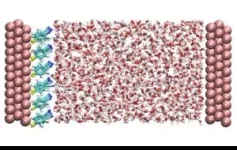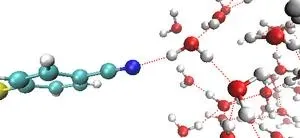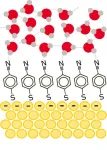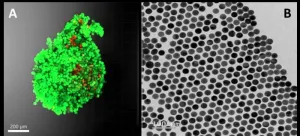(Press-News.org) EMBARGO LIFTS DEC. 18, 2023, AT 3:00 PM U.S. EASTERN TIME
As the world heats up, and the climate shifts, life will migrate, adapt or go extinct. For decades, scientists have deployed a specific method to predict how a species will fare during this time of great change. But according to new research, that method might be producing results that are misleading or wrong.
University of Arizona researchers and their team members at the U.S. Forest Service and Brown University found that the method – commonly referred to as space-for-time substitution – failed to accurately predict how a widespread tree of the Western U.S. called the ponderosa pine has actually responded to the last several decades of warming. This also implies that other research relying on space-for-time substitution may not accurately reflect how species will respond to climate change over the next several decades.
The team collected and measured ponderosa pine tree rings from across the Western U.S. going as far back as 1900 and compared the trees' actual growth to how the model predicted the trees should respond to warming.
"We found that space-for-time substitution generates predictions that are wrong in terms of whether the response to warming is a positive or negative one," said Margaret Evans, a coauthor on the paper and an associate professor in the UArizona Laboratory of Tree-Ring Research. "This method says that ponderosa pines should benefit from warming, but they actually suffer with warming. This is dangerously misleading."
Their findings are published in the Proceedings of the National Academy of Sciences. U.S. Forest Service ORISE Fellow Daniel Perret is first author and received his tree ring analysis training at the UArizona laboratory through the university's summer field methods course. This research was part of his doctoral dissertation at Brown University with Dov Sax, a professor of biogeography and biodiversity and coauthor on the paper.
This is how space-for-time substitution works: Every species occupies their preferred range of climate conditions. Scientists have assumed that the individuals growing at the hotter end of that range can serve as an example of what might happen to populations at cooler locations in a warmer future.
The team found that ponderosa pine trees grow at a faster rate at warmer locations. Under the space-for-time substitution paradigm, then, this suggests that as the climate warms at the cool edge of distribution, things should be getting better.
"But in the tree ring data, that's not what it looks like," Evans said.
But when the team used tree rings to assess how individual trees responded to changes in temperature, they found that the ponderosa's were consistently negatively impacted by temperature variability.
"If it's a warmer-than-average year, they put on a smaller-than-average ring, so warming is actually bad for them, and that's true everywhere," she said.
The team suspects that this is happening because the trees can't adapt fast enough to keep up with the quickly changing climate.
An individual tree and all its rings are a record of the genetics of that specific tree being exposed to different climatic conditions in one year compared to the next, Evans said. But how a species responds as a whole is the result of the slow pace of evolutionary adaptation to the average conditions at a specific location, which are different from another location. Like evolution, migration of better-adapted trees with the changing temperatures could potentially rescue species, but climate change is happening too fast, Evans said.
Beyond temperature, the team also investigated how trees respond to rainfall. They confirmed that more water is always better, whether you look across time or space.
"These spatially based predictions are really dangerous, because the spatial patterns reflect an end point after a long period of time when species have had a chance to evolve and disperse and, ultimately, sort themselves out on the landscape," Evans said. "But that's just not how climate change works. Unfortunately, the trees find themselves in a situation where change is happening faster than the trees can adapt, which is really putting them at risk of going extinct. It's a word of caution for ecologists."
END
Scientists might be using a flawed strategy to predict how species will fare under climate change
University of Arizona researchers say change is happening faster than trees can adapt.
2023-12-18
ELSE PRESS RELEASES FROM THIS DATE:
Mesopotamian bricks unveil the strength of Earth’s ancient magnetic field
2023-12-18
Ancient bricks inscribed with the names of Mesopotamian kings have yielded important insights into a mysterious anomaly in Earth’s magnetic field 3,000 years ago, according to a new study involving UCL researchers.
The research, published in the Proceedings of the National Academy of Sciences (PNAS), describes how changes in the Earth’s magnetic field imprinted on iron oxide grains within ancient clay bricks, and how scientists were able to reconstruct these changes from the names of the kings inscribed on the bricks.
The team hopes that using this “archaeomagnetism,” which looks for signatures ...
Move over dolphins. Chimps and bonobos can recognize long-lost friends and family — for decades
2023-12-18
Researchers led by a University of California, Berkeley, comparative psychologist have found that great apes and chimpanzees, our closest living relatives, can recognize groupmates they haven't seen in over two decades — evidence of what’s believed to be the longest-lasting nonhuman memory ever recorded.
The findings also bolster the theory that long-term memory in humans, chimpanzees and bonobos likely comes from our shared common ancestor that lived between 6 million and 9 million years ago.
The team used infrared eye-tracking cameras to record where bonobos and chimps gazed when they were shown side-by-side images of other bonobos ...
First observation of how water molecules move near a metal electrode
2023-12-18
A collaborative team of experimental and computational physical chemists from South Korea and the United States have made an important discovery in the field of electrochemistry, shedding light on the movement of water molecules near metal electrodes. This research holds profound implications for the advancement of next-generation batteries utilizing aqueous electrolytes.
In the nanoscale realm, chemists typically utilize laser light to illuminate molecules and measure spectroscopic properties to visualize molecules. However, studying the behavior of ...
Harnessing nanotechnology to understand tumor behavior
2023-12-18
A study conducted by pre-PhD researcher Pablo S. Valera and recently published in PNAS demonstrates the potential of surface-enhanced Raman spectroscopy (SERS) to explore metabolites secreted by cancer cells in cancer research. The study, which has been led by Ikerbasque Research Professors Luis Liz-Marzán (from CIC biomaGUNE) and Arkaitz Carracedo (of CIC bioGUNE) and in which other researchers from both centers, also members of the Networking Biomedical Research Centre (CIBER), have participated as well, provides valuable information to guide more specific experiments to reveal ...
Exercise-induced Pgc-1α expression inhibits fat accumulation in aged skeletal muscles
2023-12-18
Myosteatosis, or aging-related fat accumulation in skeletal muscles, is a leading cause of declines in muscle strength and quality of life in elderly adults.
Older adults who are sedentary and develop accumulated fat in the skeletal muscle are often prescribed exercise by their doctors to combat the condition. If scientists were to develop a new therapy, such as medications, to combat myosteatosis, they would need to replicate the mechanism by which exercise might reduce fat accumulation in muscles.
Fibro-adipogenic ...
NASA’s Webb rings in holidays with ringed planet Uranus
2023-12-18
NASA’s James Webb Space Telescope recently trained its sights on unusual and enigmatic Uranus, an ice giant that spins on its side. Webb captured this dynamic world with rings, moons, storms, and other atmospheric features – including a seasonal polar cap. The image expands upon a two-color version released earlier this year, adding additional wavelength coverage for a more detailed look.
With its exquisite sensitivity, Webb captured Uranus’ dim inner and outer rings, including the ...
Memory research: Breathing in sleep impacts memory processes
2023-12-18
How are memories consolidated during sleep? In 2021, researchers led by Dr. Thomas Schreiner, leader of the Emmy Noether junior research group at LMU’s Department of Psychology, had already shown there was a direct relationship between the emergence of certain sleep-related brain activity patterns and the reactivation of memory contents during sleep. However, it was still unclear whether these rhythms are orchestrated by a central pacemaker. So the researchers joined up with scientists from the Max Planck Institute for Human Development in Berlin and the University of Oxford to reanalyze the data. Their results have identified ...
Alexander Zholents recognized with 2023 Dieter Möhl Award
2023-12-18
Zholents was honored for his work on the theory of optical stochastic cooling.
Alexander Zholents, a senior physicist at the U.S. Department of Energy’s (DOE) Argonne National Laboratory and distinguished fellow in the Accelerator Systems division is one of the recipients of this year’s Dieter Möhl Award.
The award is presented by CERN, the European laboratory for particle physics. It is in tribute to the late Dieter Möhl, a pioneer in the realm of particle beam cooling. The awards celebrate both early career and lifetime achievements in the field of beam cooling and its applications.
“I am deeply honored to receive this award,” said Zholents. “The ...
Unraveling predisposition in bilateral Wilms tumor
2023-12-18
(Memphis, Tenn.—December 18, 2023) Children with bilateral Wilms tumor have a tumor in each of their kidneys — a condition that strongly suggests an underlying genetic or epigenetic predisposition driving the disease. Scientists at St. Jude Children’s Research Hospital gathered a large cohort of bilateral Wilms tumor samples and conducted analyses to assess which factors contribute to predisposition comprehensively. The work has implications for counseling patient families, guiding treatment decisions and informing the design of future clinical trials. The study was published today in Nature Communications.
Having tumors in ...
Feelings of impatience evolve over time, study says
2023-12-18
A new study answers a timely question: What is the hardest part of waiting? Consumers do plenty of it—online, in line, in traffic, or for deliveries. And now we know it’s the final phase that’s most problematic for them.
In this season of joyful—and not-so-joyful—anticipation, the research has deep implications for marketers and psychological insights for us all, says Annabelle Roberts, coauthor and assistant professor of marketing at the University of Texas McCombs School of Business. The paper shows:
It’s better for companies to communicate possible delays early in the wait;
It’s better for ...
LAST 30 PRESS RELEASES:
Wildfire smoke linked to rise in violent assaults, new 11-year study finds
New technology could use sunlight to break down ‘forever chemicals’
Green hydrogen without forever chemicals and iridium
Billion-DKK grant for research in green transformation of the built environment
For solar power to truly provide affordable energy access, we need to deploy it better
Middle-aged men are most vulnerable to faster aging due to ‘forever chemicals’
Starving cancer: Nutrient deprivation effects on synovial sarcoma
Speaking from the heart: Study identifies key concerns of parenting with an early-onset cardiovascular condition
From the Late Bronze Age to today - Old Irish Goat carries 3,000 years of Irish history
Emerging class of antibiotics to tackle global tuberculosis crisis
Researchers create distortion-resistant energy materials to improve lithium-ion batteries
Scientists create the most detailed molecular map to date of the developing Down syndrome brain
Nutrient uptake gets to the root of roots
Aspirin not a quick fix for preventing bowel cancer
HPV vaccination provides “sustained protection” against cervical cancer
Many post-authorization studies fail to comply with public disclosure rules
GLP-1 drugs combined with healthy lifestyle habits linked with reduced cardiovascular risk among diabetes patients
Solved: New analysis of Apollo Moon samples finally settles debate about lunar magnetic field
University of Birmingham to host national computing center
Play nicely: Children who are not friends connect better through play when given a goal
Surviving the extreme temperatures of the climate crisis calls for a revolution in home and building design
The wild can be ‘death trap’ for rescued animals
New research: Nighttime road traffic noise stresses the heart and blood vessels
Meningococcal B vaccination does not reduce gonorrhoea, trial results show
AAO-HNSF awarded grant to advance age-friendly care in otolaryngology through national initiative
Eight years running: Newsweek names Mayo Clinic ‘World’s Best Hospital’
Coffee waste turned into clean air solution: researchers develop sustainable catalyst to remove toxic hydrogen sulfide
Scientists uncover how engineered biochar and microbes work together to boost plant-based cleanup of cadmium-polluted soils
Engineered biochar could unlock more effective and scalable solutions for soil and water pollution
Differing immune responses in infants may explain increased severity of RSV over SARS-CoV-2
[Press-News.org] Scientists might be using a flawed strategy to predict how species will fare under climate changeUniversity of Arizona researchers say change is happening faster than trees can adapt.







